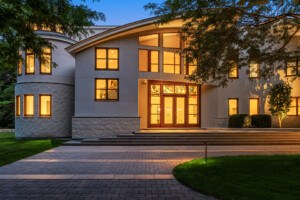South Boston’s Gate of Heaven Condo Project Is Pretty Much DOA
Nary a tear was shed in South Boston on Wednesday when word came down that the Boston Redevelopment Authority had pulled from its agenda a vote on the controversial proposal to turn the Gate of Heaven School into condominiums.
Oranmore Enterprises had wanted to renovate the school into 31 units of residential housing with 40 surface parking spaces. The BRA was set to discuss the project at tonight’s monthly board meeting. But, without the support of residents or, apparently, the mayor, the vote is now off the table. This was at least the third proposal to come from a developer since the Archdiocese of Boston closed the school in 2009.
Neighborhood opposition was fierce. (One poll had the plans losing by an 88-to-12 percent margin.) There were multiple public meetings hosted by the BRA attended by crowds of residents unhappy with the developer’s plans, who stood to express their displeasure. There were concerns over the density (the number of units), and that there wasn’t enough parking.
That’s a sentiment shared by many residents in Boston’s neighborhoods, but the level of opposition—and it being close to universal—are what set this apart from other NIMBY responses.
Typical of this point of view is this commenter on the Caught in Southie blog:
These developers are are taking every available spot in town flipping them for millions and then go on their way, leaving us with more parking problems and arrogant new neighbors. … The gate of heaven school means too much to this community to have it gutted for luxury condos. Let’s take it back.
The Gate of Heaven Church is a sacred place to many people in South Boston (pun intended), and the idea of its school being turned into condominiums—”luxury” condominiums is what they call them—is heretical. There is even a sense of betrayal in what the Archdiocese has done; in their minds, it’s sold them out.
Southie residents know that most, if not all, of the condos in the building would be sold to people not from the neighborhood. Again, that means change and a disruption to the status quo. Certainly, that feeling of unease can be respected.
Southie has done its fair share when it comes to building new apartment and condominium complexes. Over 1,000 units of housing are proposed, approved, or under construction right now—and that doesn’t include any of the buildings going up in the nearby Seaport District or Fort Point Channel. That’s pretty significant in a city that, in the past decade, built 2,000 units a year.
The majority of Southie residents aren’t against “everything.” It’s just that they’re interested in making their neighborhood better. Many don’t want the Gate of Heaven school turned into condos, but they understand that something has to be done with the property that’s going on 5 years gathering dust. There is strong support for a charter school to open up there—two existing charter schools have expressed interest, apparently.
Anyone living in Boston should empathize with Southie residents. Similar to what Chinatown is going through, these residents seem to be facing an intractable problem: everyone wants to live there, but not everyone can afford to.
Who should decide what types of neighborhoods we should all live in? Current residents who already know what it’s like to live there but who, frankly, have their own self-interests at heart? Or, those who want to move in and become one of those long-term residents, continuing what has been, for a couple centuries now, how neighborhoods in cities change and develop?
The BRA seems to have done the right thing in this specific case. With nearly universal opposition, was there any reason to give the developer the right to build something that was against everyone’s wishes (and, by the way, that needed zoning relief)?
But, now that the plan has been shot down, what now? Do you let the land lie fallow, in the hopes that someone comes to the rescue? Does that benefit the Church, the community, or the city’s taxpayers?
To be continued.


